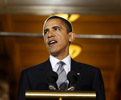
“We gather today to mourn the loss of so many lives, and celebrate those who saved them; honor those who survived, and contemplate the obligations of the living.”
So began President Obama’s poignant remarks at the Holocaust Memorial Museum’s Days of Remembrance ceremony yesterday in the rotunda of the U.S. Capitol. Surrounded by Holocaust survivors and rescuers, members of Congress, and activists, the president highlighted the theme of this yearly event: What You Do Matters.
"Today and every day we have an opportunity as well as an obligation to confront these scourges, to fight the impulse to turn the channel when we see images that disturb us or wrap ourselves in the false comfort that others sufferings are not our own."
When we look back at these darkest hours of modern history, we often focus on the combination of elements that made Europe in 1933-45 or Rwanda in 1994 combustible. The individual decisions that led people to commit unspeakable acts on such a wide scale are more difficult to grapple with because they inevitably require a level of self-reflection. “No one is born a savior or a murderer — these are choices we each have the power to make… [N]o one can make us into bystanders without our consent.”
The president recognized individuals who refused to stand by when they saw humanity at risk, and instead chose to stand up. He paid tribute to five men and women who provided safe havens for Jews in Poland during World War II, subjecting themselves to personal danger to protect others. “Your presence today compels each of us to ask ourselves whether we would have done what you did. We can only hope that the answer is yes,” President Obama said.
Today, as unprecedented and ever-growing numbers of activists are compelled to join movements calling for attention to crises, President Obama’s words ring true. “If we have the courage to heed that ‘still, small voice’ within us, we can form a minyan [quorum] for righteousness that can span a village, even a nation.”
Whether in the midst of a crisis or its aftermath, silence is “evil’s greatest co-conspirator,” the president said, a lesson that is salient today, for, as he reminded us, “Evil has yet to run its course on Earth.” Someday, when Darfur has found peace, a new human tragedy, in another corner of the world, will demand our attention. How will we respond? What will it take for the international community to learn to prevent genocide, rather than just pick up the pieces in its wake?
“[W]e have the opportunity to make a habit of empathy; to recognize ourselves in each other; to commit ourselves to resisting injustice and intolerance and indifference in whatever forms they may take — whether confronting those who tell lies about history, or doing everything we can to prevent and end atrocities like those that took place in Rwanda, those taking place in Darfur. That is my commitment as President. I hope that is yours, as well.”
As we commemorate 60 years since the Holocaust and remember numerous human tragedies since, it’s clear that the world needs President Obama to champion “Never Again” and, this time, make it count.
Clicke here to view the entire ceremony and here to read President Obama’s full remarks.

